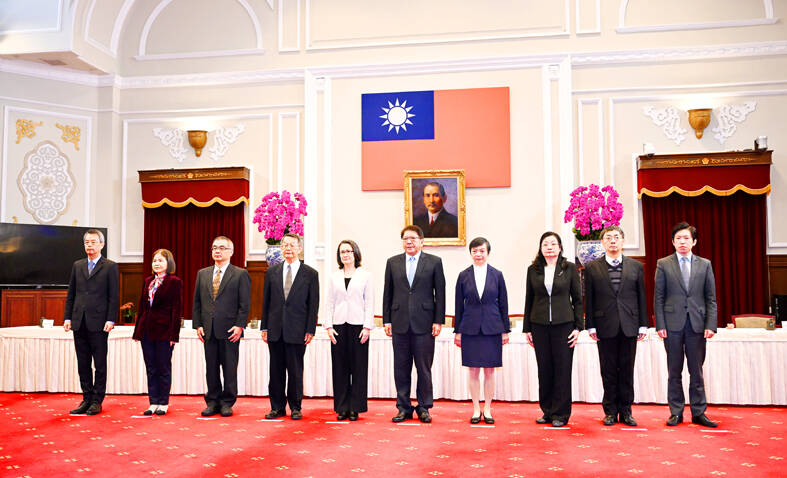Vice President Hsiao Bi-khim (蕭美琴) announced seven nominees for the Constitutional Court today, nearly two months after the legislature rejected President William Lai’s (賴清德) previous selections.
Taiwan High Prosecutors’ Office Chief Prosecutor Tsai Chiu-ming (蔡秋明) was nominated for Judicial Yuan president, while Supreme Court Justice Su Su-e (蘇素娥) was tapped for vice president, Hsiao told a news conference in Taipei.
The other five nominees are National Chung-Cheng University law professor Hsiao Wen-sheng (蕭文生), Supreme Court Justice Cheng Chun-hui (鄭純惠), Taiwan High Prosecutors’ Office Chief Prosecutor Lin Li-ying (林麗瑩), legal expert Chen Tzu-yang (陳慈陽) and National Chengchi University law professor Chan Chen-jung (詹鎮榮).

Photo: Lo Pei-de, Taipei Times
The nominees’ expertise covers civil, criminal, administrative and constitutional law, and would result in a judiciary that the public can trust, the Presidential Office said.
Hsiao Bi-khim praised Tsai and Su for their extensive experience, notably their roles in trying a major corruption case in the 1990s regarding the military’s procurement of La Fayette-class frigates from France.
They have made “significant contributions to Taiwanese efforts to recover illicit gains,” Hsiao Bi-khim said, referring to bribes and kickbacks taken by officials and arms brokers involved in the deal.
The president made the nominations after careful consideration and consultations with various parties, and asks the Legislative Yuan to approve the nominees, she said.
Lai nominated seven candidates in August last year to replace judges whose eight-year terms expired on Oct. 31 last year, but they all were rejected by the Legislative Yuan in December last year.
That prevented the Judicial Yuan from functioning normally and disrupted the separation of powers between the five branches of government, Hsiao Bi-khim said, adding that she hopes the ruling and opposition parties would uphold professionalism and consider diverse issues that concern the public, and agree this time.
The Constitutional Court, which normally has 15 justices, but currently only has eight, has been effectively immobilized since measures passed by opposition lawmakers requiring a minimum of 10 justices to hear and rule on a case took effect on Jan. 25.
Tsai in a speech after the announcement said Taiwan is facing a serious constitutional crisis, with power imbalances between the government’s branches.
Many legal and political challenges brought about by agencies involve constitutional issues that should be addressed by the court, he said.
Taiwan People’s Party Chairman Huang Kuo-chang (黃國昌) said the Democratic Progressive Party (DPP) was trying to return to the era when “justices and prosecutors were one family” by nominating a prosecutor as Judicial Yuan president.
He questioned whether the nominees would owe “loyalty” to the DPP, and whether they would be rejected if they criticize the party.
The Chinese Nationalist Party (KMT) in a statement said its members would responsibly review the nominees from different perspectives to exercise their constitutional obligations.
The nominees should state whether they support the death penalty and favor imposing heavier penalties on those who are convicted of abusing children, it added.
DPP caucus whip Ker Chien-ming (柯建銘) said that although he agreed that it is inappropriate to nominate a prosecutor as Judicial Yuan president, he believed Lai was prudent in nominating the candidates.
DPP caucus chief executive Rosalia Wu (吳思瑤) said it would be unfair to criticize the nominees when the required documents have not even been sent to the legislature, adding that the DPP respects the president’s authority in the matter.
Additional reporting by Su Yung-yao

The manufacture of the remaining 28 M1A2T Abrams tanks Taiwan purchased from the US has recently been completed, and they are expected to be delivered within the next one to two months, a source said yesterday. The Ministry of National Defense is arranging cargo ships to transport the tanks to Taiwan as soon as possible, said the source, who is familiar with the matter. The estimated arrival time ranges from late this month to early next month, the source said. The 28 Abrams tanks make up the third and final batch of a total of 108 tanks, valued at about NT$40.5 billion

Two Taiwanese prosecutors were questioned by Chinese security personnel at their hotel during a trip to China’s Henan Province this month, the Mainland Affairs Council (MAC) said yesterday. The officers had personal information on the prosecutors, including “when they were assigned to their posts, their work locations and job titles,” MAC Deputy Minister and spokesman Liang Wen-chieh (梁文傑) said. On top of asking about their agencies and positions, the officers also questioned the prosecutors about the Cross-Strait Joint Crime-Fighting and Judicial Mutual Assistance Agreement, a pact that serves as the framework for Taiwan-China cooperation on combating crime and providing judicial assistance, Liang

A group from the Taiwanese Designers in Australia association yesterday represented Taiwan at the Midsumma Pride March in Melbourne. The march, held in the St. Kilda suburb, is the city’s largest LGBTQIA+ parade and the flagship event of the annual Midsumma Festival. It attracted more than 45,000 spectators who supported the 400 groups and 10,000 marchers that participated this year, the association said. Taiwanese Designers said they organized a team to march for Taiwan this year, joining politicians, government agencies, professionals and community organizations in showing support for LGBTQIA+ people and diverse communities. As the first country in Asia to legalize same-sex

MOTIVES QUESTIONED The PLA considers Xi’s policies toward Taiwan to be driven by personal considerations rather than military assessment, the Epoch Times reports Chinese President Xi Jinping’s (習近平) latest purge of the Chinese People’s Liberation Army (PLA) leadership might have been prompted by the military’s opposition to plans of invading Taiwan, the Epoch Times said. The Chinese military opposes waging war against Taiwan by a large consensus, putting it at odds with Xi’s vision, the Falun Gong-affiliated daily said in a report on Thursday, citing anonymous sources with insight into the PLA’s inner workings. The opposition is not the opinion of a few generals, but a widely shared view among the PLA cadre, the Epoch Times cited them as saying. “Chinese forces know full well that